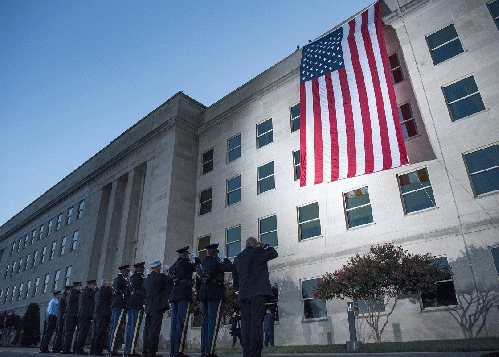From Consortium News

Honor Guard stands at attention on South Lawn of White House during a flyover by the U.S. Air Force Thunderbirds and the U.S. Navy Blue Angels, July 4, 2020.
(Image by (White House, Andrea Hanks)) Details DMCA
What are we in for on the foreign policy side come Nov. 3? Whoever wins this election, Joe Biden or Donald Trump, the answers before us are grim. For those who vote, the choice lies between a mentally impaired restorationist and a paralyzed captive of what some of us call the Deep State.
Think about this. The illiberal liberals, the only kind there are now, advertise Nov. 3 as the most decisive election in generations. This assertion is questionable even in the domestic context, but that is another conversation. As to the direction of U.S. foreign policy, there is no question: Between Biden and Trump, we are at bottom offered no alternative to our anxious empire's conduct abroad.
Lawlessness, war and more war, destructive interventions in the name of righteous humanitarianism: We have no one but ourselves to blame for what will confront us in the four years to come. The divisive, nonsensical distractions of identity politics, "intersectionalism," and all such narcissistic preoccupations carry a cost: No word is spoken among "progressives" about America's imperial adventures. The lives of our countless victims abroad do not matter. The structures of power remain unchallenged.
This election is indeed of great significance, in my view. Given the absolute absence of any check on Washington's projection of hegemonic power, known politely as "global leadership," it will force a question upon us it is long past time to pose: Do Americans live under a de facto military government?
Tenuous Civilian Control of Pentagon
Anyone who thinks this suggestion is extreme should consider how tenuous civilian control of the Pentagon has been for many years. The defense industries bought Capitol Hill long ago. This is documented fact, however seldom acknowledged. The military-industrial complex's power over the executive is just as real but less defined, and it has been especially apparent since Trump began his presidential campaign in 2015.
Foreign policy took up several important planks in Trump's platform, readers may recall. He campaigned promising to reduce the military's presence abroad, end our wars of adventure, ease NATO into the history books, and make a constructive relationship with Russia out of the unnecessary hostilities Barack Obama and Hillary Clinton, his secretary of state, left behind. These positions won him votes.
They won him enemies, too. A bevy of top national security officials and retired generals published open letters in The New York Times calling Trump a threat to national security. Michael Hayden, a retired general and former CIA director, suggested in February 2016 that the military would refuse to follow orders if Trump were elected and pursued his campaign promises.
Foiled Incumbent
Unsurprisingly, we have seen virtually no progress toward Trump's objectives since he took office in January 2017. The Pentagon and the national security apparatus have ignored, circumvented, or otherwise subverted his orders to withdraw troops from foreign theaters, notably Syria and now Germany. Relations with Russia have dramatically worsened. NATO still pretends it has a function in the post-Soviet era.
These failures have three causes.
One, Trump is surrounded by people vigorously, ideologically opposed to his foreign policy goals, chief among them John Bolton, briefly his national security adviser, and Secretary of State Mike Pompeo. The only way to explain these appointments is to assume they were forced upon him. Trump, after all, doesn't refer to the State Department as "the Deep State Department" for no reason. He is telling us something about his circumstances.
Two, Trump has proven impossibly erratic, saying one thing and doing another or doing one thing and later on saying another. This reflects his ignorance of the policymaking process and his near-complete lack of an intellectual framework through which to judge events and formulate strategies to sustain his objectives. Dealmaking in the fashion of a New York real estate developer simply doesn't do it.
(Note: You can view every article as one long page if you sign up as an Advocate Member, or higher).






